Leading Salesforce Alternatives to Boost Your CRM Strategy
Written by: Hrishikesh Pardeshi, Founder at Flexiple, buildd & Remote Tools.
Last updated: Jan 26, 2025
Salesforce has long been a dominant player in the Customer Relationship Management (CRM) space, offering a comprehensive suite of tools for businesses of all sizes. However, as the market evolves, several alternatives have emerged, providing unique features, pricing models, and specialized functionalities that cater to diverse business needs. Whether you're a small startup looking for an affordable solution or a large enterprise seeking advanced customization, exploring Salesforce alternatives can help you find the perfect fit for your organization.
Best Salesforce Alternatives are:
HubSpot CRM
Zoho CRM
Pipedrive
Freshsales
Copper
SugarCRM
If you're considering Salesforce alternatives, these six platforms offer a range of features tailored to different business requirements. From HubSpot CRM's inbound marketing capabilities to SugarCRM's flexible deployment options, each alternative brings its own strengths to enhance your customer management and sales processes.
Table of Contents
Why Do You Need Alternatives to Salesforce?
While Salesforce is a powerful and versatile CRM solution, it may not be the ideal choice for every business. Factors such as cost, complexity, and specific feature requirements can drive organizations to seek alternatives. Salesforce's extensive customization options and robust feature set come at a premium price, which might be prohibitive for small to medium-sized businesses. Additionally, the learning curve associated with Salesforce can be steep, making it challenging for teams to adopt and utilize the platform effectively without significant training.
Salesforce alternatives often provide more affordable pricing structures, simpler interfaces, and specialized functionalities that align better with specific business needs. Whether you require a CRM focused on sales automation, marketing integration, or ease of use, exploring these alternatives can help you identify a solution that offers the right balance of features and cost for your organization.
Who Should Consider Using Salesforce Alternatives?
You should consider using Salesforce alternatives if you're looking for CRM solutions that better align with your budget, feature requirements, or ease of use. Here’s a look at who might benefit from these alternatives and why:
Small Businesses and Startups
For small businesses and startups with limited budgets, Salesforce alternatives like HubSpot CRM and Zoho CRM offer robust features at a more affordable price point. These platforms provide essential CRM functionalities without the high costs associated with Salesforce, making them ideal for organizations just starting out.
Sales Teams Focused on Efficiency
Sales teams that prioritize streamlined processes and sales pipeline management may find Pipedrive and Freshsales to be more suited to their needs. These alternatives emphasize ease of use and efficiency, enabling sales professionals to manage leads and close deals more effectively.
Marketing Teams Seeking Integration
Marketing teams that require seamless integration with marketing automation tools may prefer HubSpot CRM or Copper. These platforms offer robust marketing features and integrations that facilitate cohesive marketing and sales strategies.
Enterprises Needing Customization
Large enterprises that need extensive customization and flexible deployment options might opt for SugarCRM. This alternative provides the flexibility to tailor the CRM to specific business processes and integrate with a wide range of third-party applications.
Organizations Prioritizing User Experience
Businesses that value a user-friendly interface and ease of adoption may find Copper and Zoho CRM to be more intuitive compared to Salesforce. These platforms are designed with user experience in mind, reducing the learning curve and enhancing team productivity.
Salesforce Alternatives Comparison Table
| Feature | HubSpot CRM | Zoho CRM | Pipedrive | Freshsales | Copper | SugarCRM |
|---|---|---|---|---|---|---|
| Ease of Use | Very Easy | Easy | Very Easy | Easy | Very Easy | Moderate |
| Pricing | Free & Paid Plans | Free & Paid Plans | Paid | Free & Paid Plans | Paid | Paid |
| Platform Support | Browser-based | Browser-based, Mobile | Browser-based | Browser-based, Mobile | Browser-based | Browser-based, On-Premise |
| Customization Options | Moderate | Advanced | Limited | Moderate | Moderate | Advanced |
| Specialty | Inbound Marketing | Comprehensive CRM Suite | Sales Pipeline Management | AI-Powered Insights | Google Workspace Integration | Flexible Deployment Options |
Best Salesforce Alternatives
If you're searching for robust CRM solutions, exploring the best Salesforce alternatives can help you find the right fit. While Salesforce is renowned for its comprehensive CRM software capabilities, other platforms offer unique benefits, such as affordability, ease of use, or specialized functionalities. Whether you’re a small business, a sales-driven team, or an enterprise seeking extensive customization, these alternatives provide fresh perspectives and tailored customer service tools to enhance your customer management and sales processes. Here’s a detailed look at some of the top Salesforce alternatives to consider for your CRM needs, which can potentially improve customer satisfaction by leveraging customer data through advanced customer service software.
1. HubSpot CRM
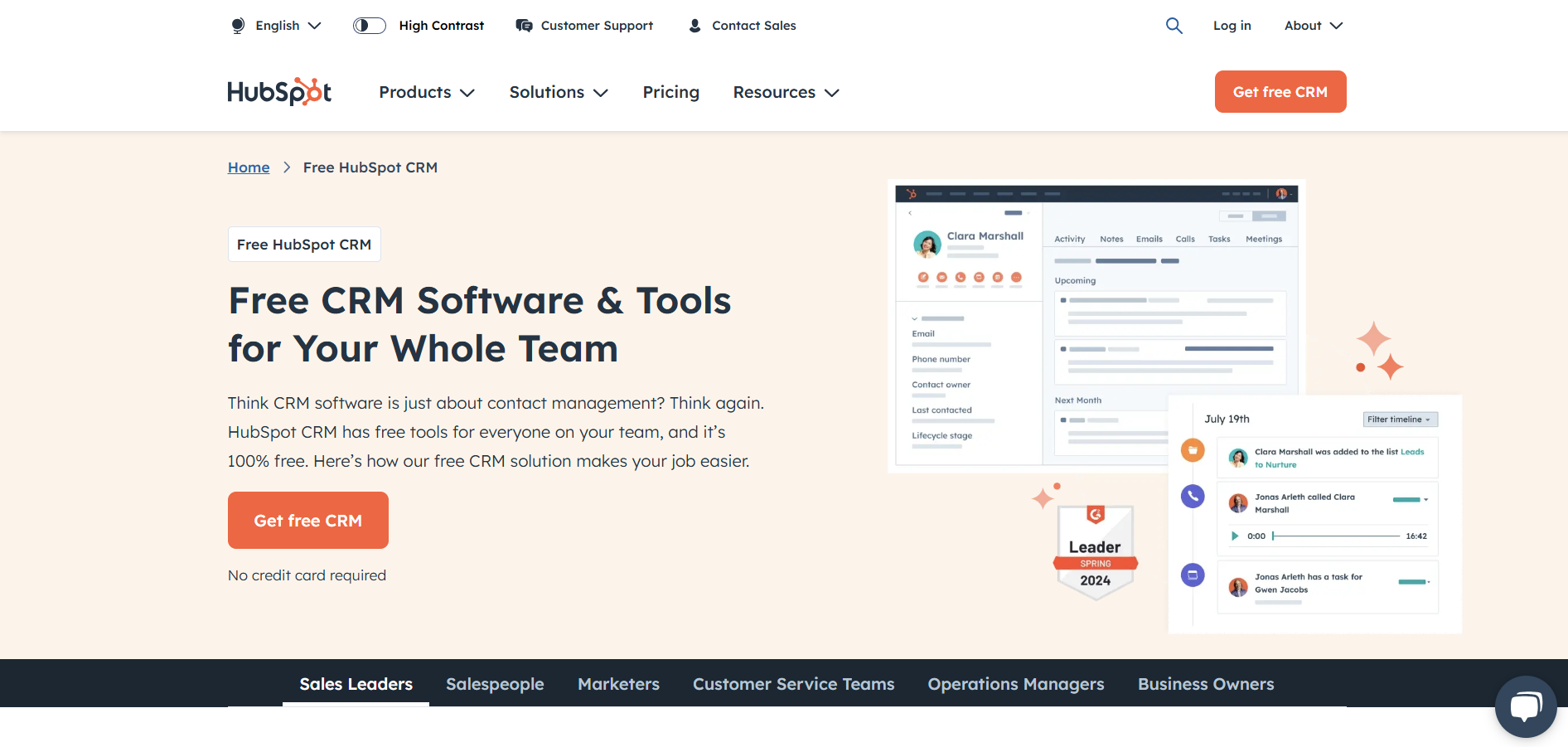
HubSpot CRM is a widely recognized Salesforce alternative, particularly favored by small to medium-sized businesses and startups. It offers a user-friendly interface and integrates seamlessly with HubSpot’s marketing, sales, and service hubs, providing a unified platform for managing customer relationships and driving growth.
HubSpot CRM vs Salesforce
HubSpot CRM stands out with its intuitive design and free entry-level offering, making it accessible for businesses with limited budgets. Unlike Salesforce, which can be complex and expensive, HubSpot provides a straightforward setup and easy-to-use tools that allow teams to get up and running quickly. While Salesforce offers extensive customization and a broader range of features, HubSpot excels in inbound marketing and sales automation tools, making it ideal for businesses focused on these areas. Its CRM system also helps automate repetitive tasks and integrates with enterprise resource planning software, enhancing efficiency per user. This suite of business tools ensures streamlined operations and effective management of customer relationships.
Key Features of HubSpot CRM
Contact and lead management
Email tracking and notifications
Sales pipeline management
Marketing automation integration
Reporting and analytics
Integration with various third-party apps
HubSpot CRM Pros
Free tier available with essential features
User-friendly interface and easy setup
Strong integration with HubSpot’s marketing tools
Scalable with paid plans offering advanced functionalities
Extensive library of resources and support
HubSpot CRM Cons
Advanced features can become costly with paid plans
Limited customization compared to Salesforce
Some users may find the free version restrictive for larger teams
HubSpot CRM Pricing
HubSpot CRM offers a free plan that includes basic CRM functionalities. Paid plans start with the Starter package, which adds more features and support, scaling up to Professional and Enterprise tiers for larger organizations requiring advanced tools and integrations.
2. Zoho CRM
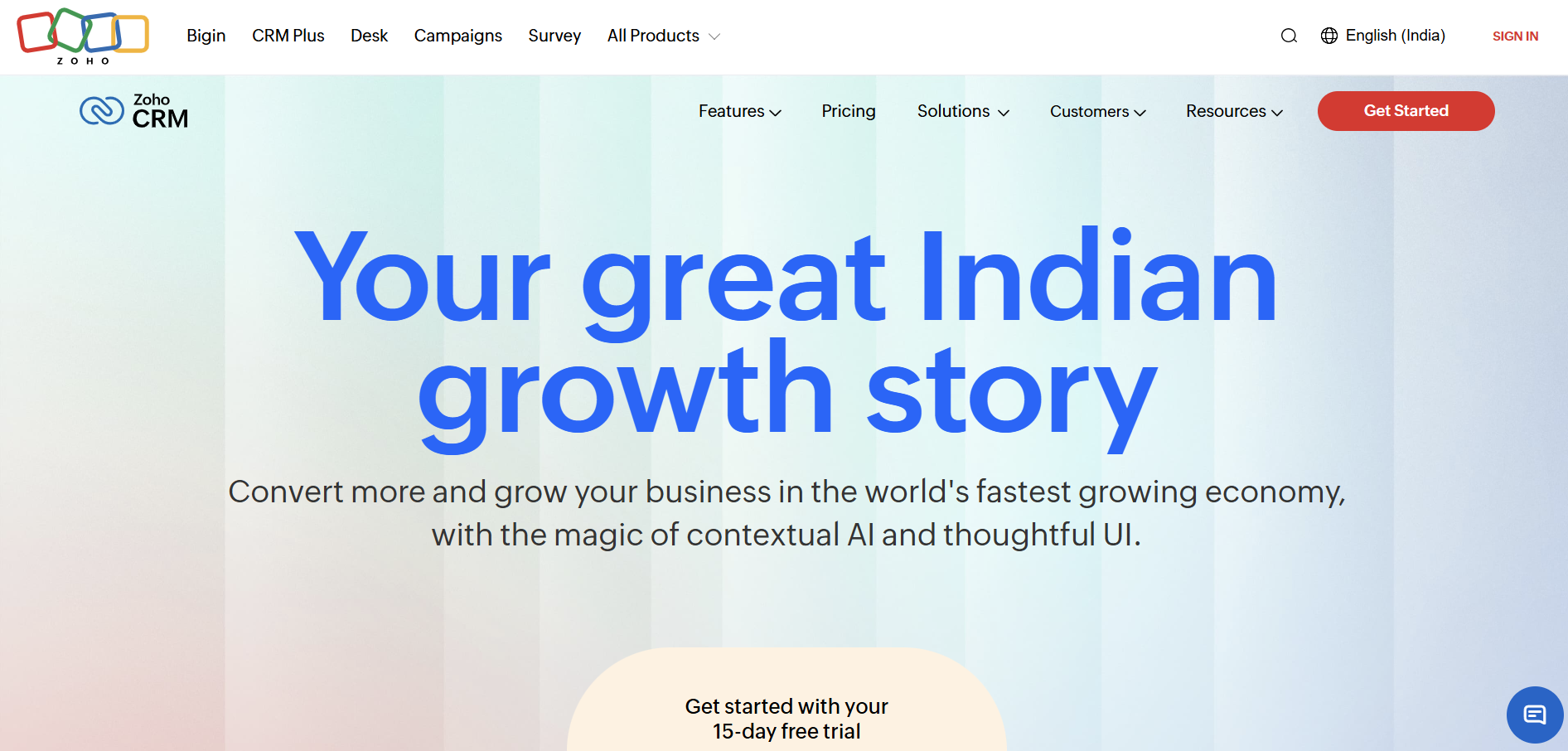
Zoho CRM is a comprehensive Salesforce alternative that caters to businesses of all sizes. It offers a wide range of features, including sales automation, marketing automation, customer support, and analytics, making it a versatile choice for organizations looking to streamline their customer management processes.
Zoho CRM vs Salesforce
Zoho CRM provides a more affordable pricing structure compared to Salesforce, making it an attractive option for businesses seeking robust CRM capabilities without the high costs. While Salesforce offers extensive customization and a vast ecosystem of integrations, Zoho CRM balances functionality with cost-effectiveness, providing a rich set of features that can be tailored to specific business needs.
Key Features of Zoho CRM
Lead and contact management
Sales automation and pipeline management
Marketing automation and email campaigns
Customer support and help desk
Analytics and reporting
Integration with Zoho Suite and third-party applications
Zoho CRM Pros
Affordable pricing with a range of plans
Extensive feature set covering sales, marketing, and support
Highly customizable with various modules and workflows
Integration with Zoho’s suite of business applications
AI-powered sales assistant for enhanced productivity
Zoho CRM Cons
The interface can be overwhelming for new users
Some advanced features may require higher-tier plans
Integration with non-Zoho apps may require additional configuration
Zoho CRM Pricing
Zoho CRM offers a free tier for up to three users, making it suitable for small teams. Paid plans start with the Standard package, progressing to Professional, Enterprise, and Ultimate tiers, each adding more advanced features and customization options to meet the needs of growing businesses.
3. Pipedrive
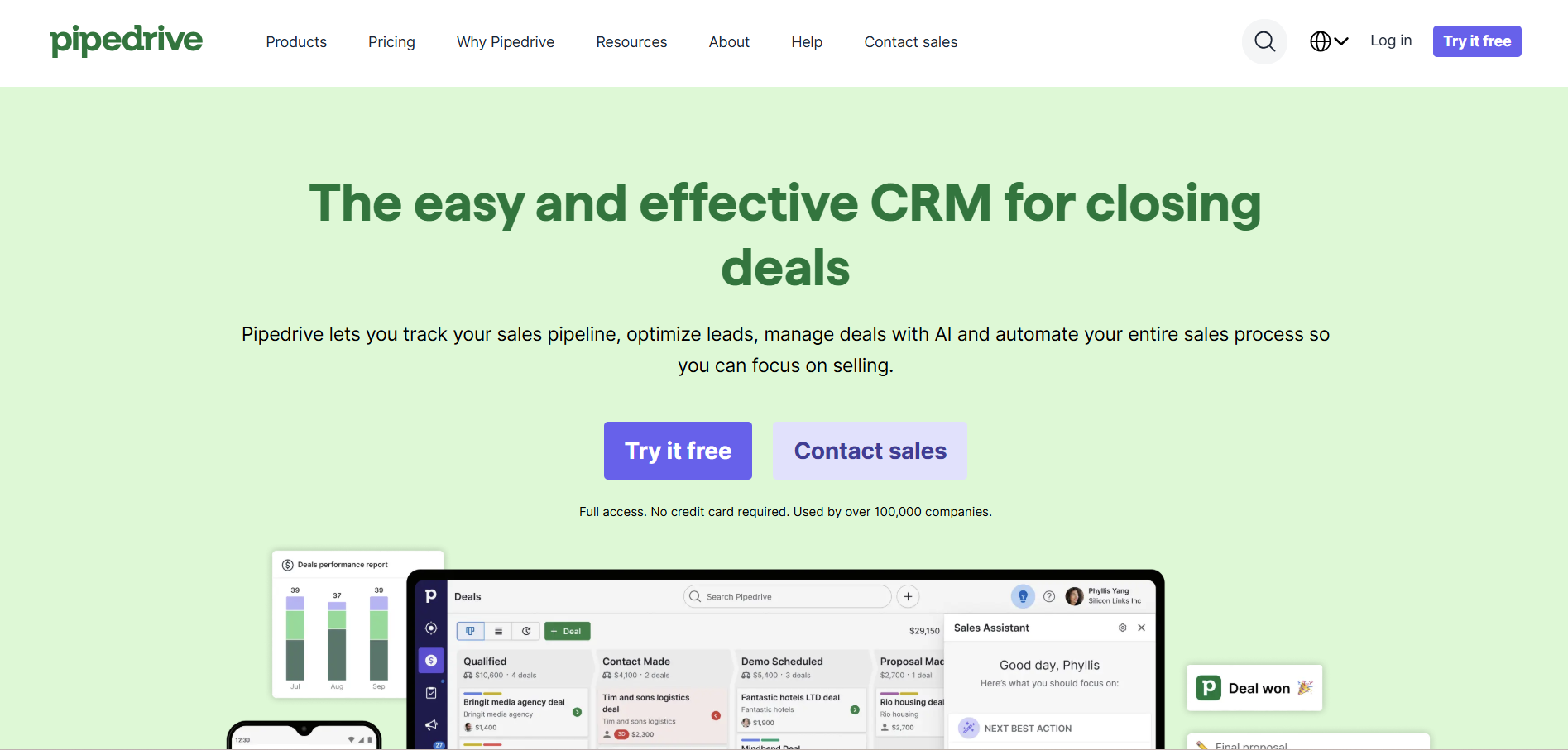
Pipedrive is a sales-focused CRM that emphasizes pipeline management and sales automation. It is designed to help sales teams manage leads, track communications, and close deals more efficiently, making it a strong alternative to Salesforce for businesses primarily focused on sales performance.
Pipedrive vs Salesforce
Pipedrive offers a simpler and more intuitive interface compared to Salesforce, making it easier for sales teams to adopt and use effectively. While Salesforce provides a broader range of CRM functionalities, Pipedrive concentrates on optimizing the sales process with features tailored to pipeline management and sales forecasting, appealing to organizations that prioritize sales efficiency over extensive CRM capabilities.
Key Features of Pipedrive
Visual sales pipeline management
Lead and deal tracking
Email integration and tracking
Sales automation and workflow customization
Reporting and sales analytics
Integration with various sales and productivity tools
Pipedrive Pros
User-friendly interface with visual pipeline
Focused on sales activities and performance
Affordable pricing for small to medium-sized businesses
Easy setup and quick onboarding
Strong mobile app for on-the-go access
Pipedrive Cons
Limited features beyond sales management
Customization options are not as extensive as Salesforce
Advanced reporting requires higher-tier plans
Pipedrive Pricing
Pipedrive offers a free trial period, after which paid plans start with the Essential package and scale up to Advanced and Professional tiers. Each plan adds more features, such as advanced reporting, workflow automation, and enhanced customization options to support growing sales teams.
3. Freshsales
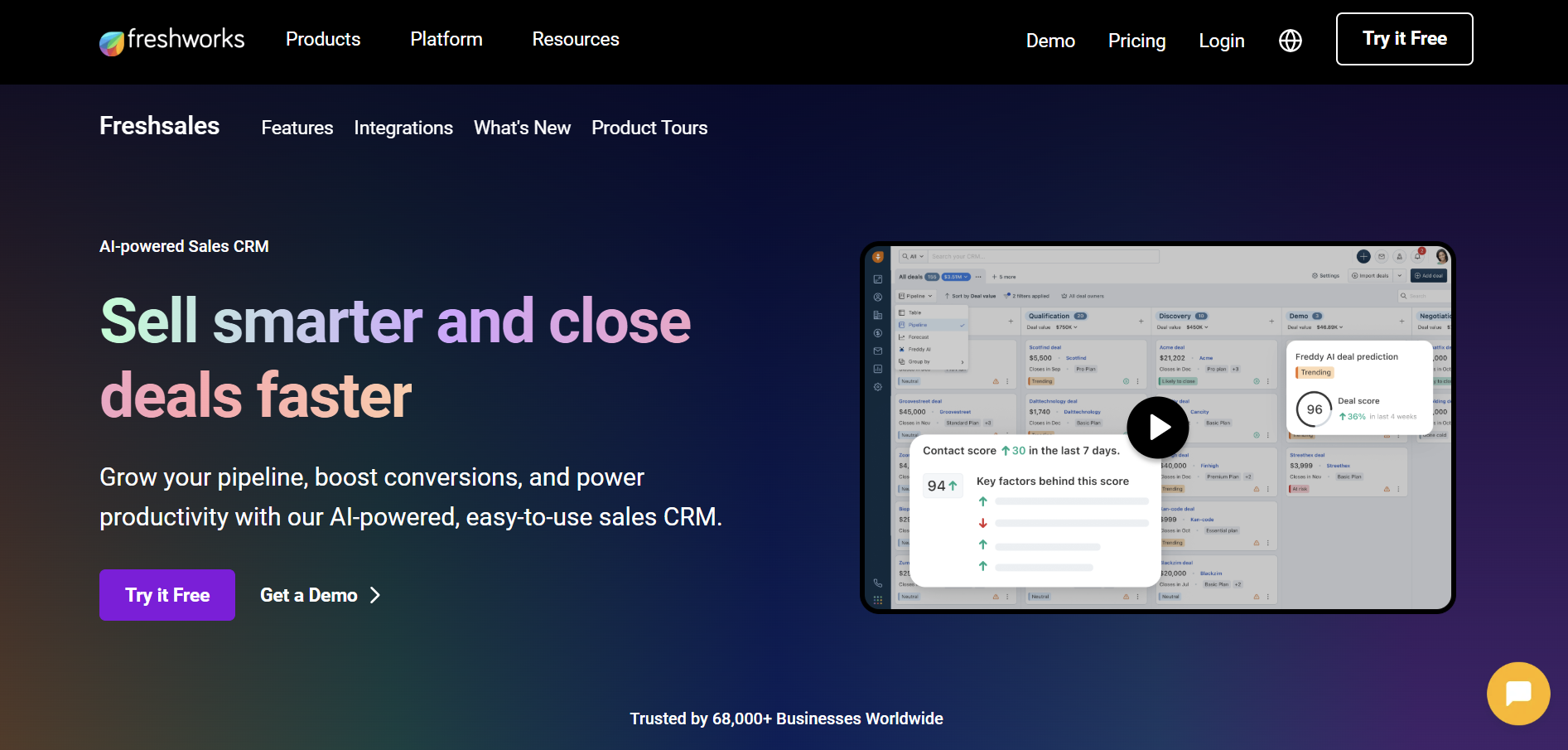
Freshsales, part of the Freshworks suite, is a robust CRM solution that combines sales automation, marketing automation, and customer support functionalities. It is designed to help businesses manage their customer interactions effectively, making it a compelling alternative to Salesforce for organizations seeking an all-in-one CRM platform.
Freshsales vs Salesforce
Freshsales provides a balanced mix of features and affordability, positioning itself as a versatile alternative to Salesforce. While Salesforce offers a highly customizable and extensive CRM ecosystem, Freshsales emphasizes ease of use and integration with other Freshworks products, making it suitable for businesses looking for a unified solution without the complexity and cost associated with Salesforce.
Key Features of Freshsales
Lead and contact management
Email tracking and templates
Sales pipeline management
Marketing automation tools
Customer support and ticketing
AI-based insights and forecasting
Freshsales Pros
Comprehensive feature set covering sales, marketing, and support
Intuitive user interface and easy navigation
Competitive pricing with scalable plans
Integration with Freshworks ecosystem and third-party apps
AI-driven insights to enhance sales strategies
Freshsales Cons
Advanced customization options are limited compared to Salesforce
Some users may find the marketing automation features basic
Learning curve for utilizing all integrated functionalities
Freshsales Pricing
Freshsales offers a free plan with basic CRM features, suitable for small teams. Paid plans start with the Growth package and advance to Pro and Enterprise tiers, each adding more sophisticated tools such as advanced analytics, custom modules, and enhanced support to meet the needs of larger organizations.
4. Copper

Copper CRM, formerly known as ProsperWorks, is a CRM solution deeply integrated with Google Workspace (formerly G Suite). It is designed to streamline workflow by leveraging the tools businesses already use, making it an excellent alternative to Salesforce for organizations that rely heavily on Google’s ecosystem.
Copper vs Salesforce
Copper stands out with its seamless integration with Google Workspace, allowing users to manage CRM tasks directly within Gmail, Google Calendar, and other Google apps. Unlike Salesforce, which requires more extensive setup and customization, Copper offers a more straightforward and user-friendly approach, ideal for businesses that prioritize ease of use and integration with Google’s suite of tools.
Key Features of Copper
Google Workspace integration for seamless workflow
Contact and lead management directly within Gmail
Sales pipeline management and tracking
Task and project management tools
Reporting and analytics
Integration with various third-party applications
Copper Pros
Deep integration with Google Workspace enhances productivity
Intuitive interface that reduces the learning curve
Automated data entry and updates through Gmail integration
Flexible pricing plans tailored to different business sizes
Strong customer support and onboarding resources
Copper Cons
Limited customization options compared to Salesforce
Best suited for businesses already using Google Workspace
Advanced features are only available in higher-tier plans
Copper Pricing
Copper offers a free trial period, after which paid plans start with the Basic package and scale up to Professional and Business tiers. Each plan adds more features, such as advanced reporting, workflow automation, and enhanced integrations, catering to the needs of growing businesses and larger teams.
5. SugarCRM
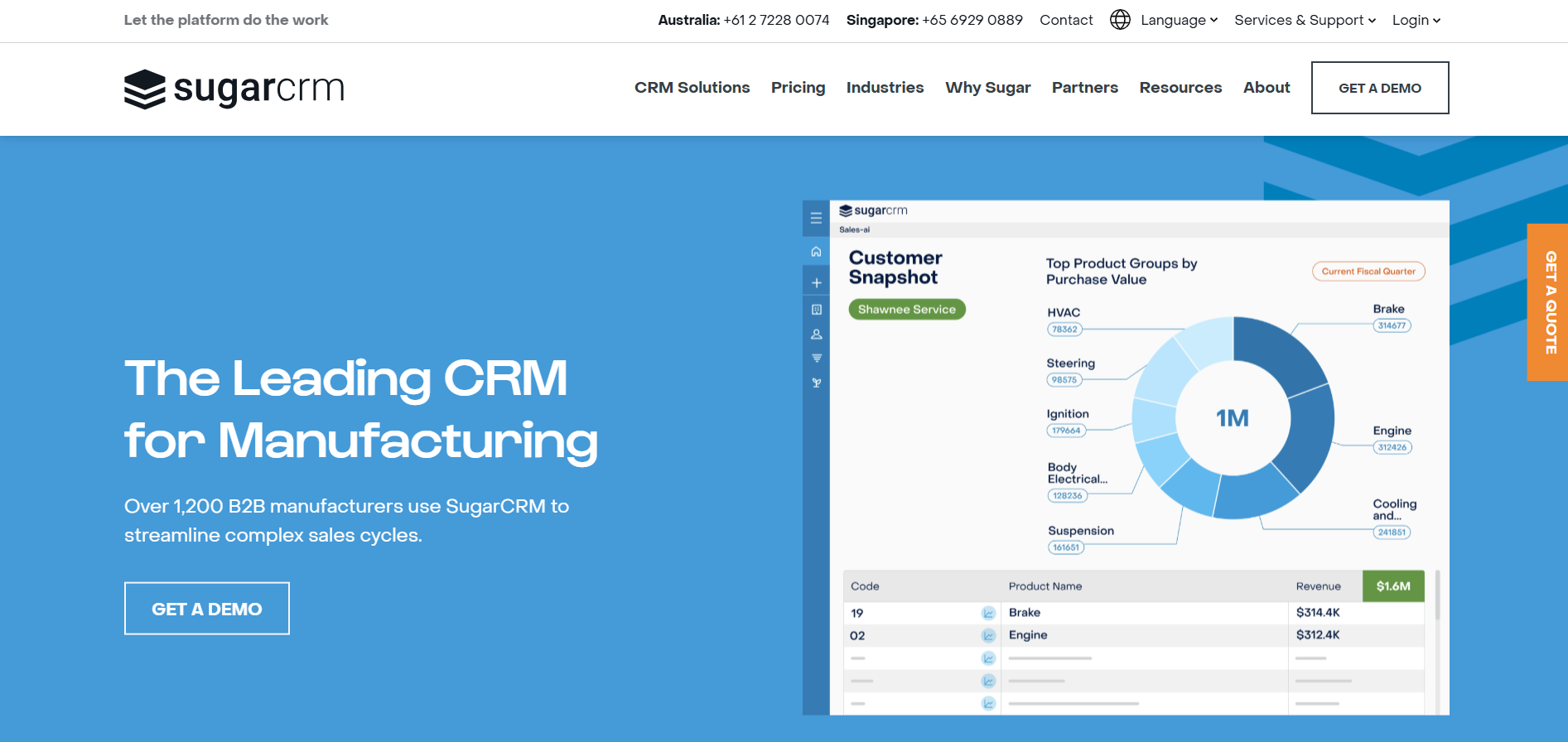
SugarCRM is a versatile CRM platform that offers both cloud-based and on-premise deployment options. It is known for its flexibility and extensive customization capabilities, making it a suitable alternative to Salesforce for businesses that require a tailored CRM solution.
SugarCRM vs Salesforce
SugarCRM provides a high level of customization and flexibility, allowing businesses to modify the CRM to fit their specific processes and workflows. While Salesforce offers extensive customization through its platform, SugarCRM offers a more straightforward and potentially cost-effective approach for organizations that need a CRM that can be tailored without the complexity of Salesforce’s ecosystem.
Key Features of SugarCRM
Contact and lead management
Sales automation and pipeline management
Marketing automation and campaign management
Customer support and service management
Reporting and analytics
Integration with various business applications
SugarCRM Pros
Highly customizable to fit unique business needs
Offers both cloud-based and on-premise deployment options
Robust feature set covering sales, marketing, and support
Scalable solutions suitable for businesses of all sizes
Strong data security and compliance features
SugarCRM Cons
Can be more complex to set up compared to other alternatives
Higher cost for extensive customization and features
Limited out-of-the-box integrations compared to Salesforce
SugarCRM Pricing
SugarCRM provides different pricing tiers based on deployment options and feature sets. The pricing starts with the Sell package and progresses to Serve, Explore, and Ultimate tiers, each adding more advanced functionalities and customization options to support the diverse needs of businesses.
FAQs On Salesforce Alternatives
1. What are the top alternatives to Salesforce?
The top alternatives to Salesforce include HubSpot CRM, Zoho CRM, Pipedrive, Freshsales, Copper, and SugarCRM. These tools offer a range of features suitable for various customer management and sales needs.
2. Why should I consider using an alternative to Salesforce?
Alternatives to Salesforce may offer benefits like lower costs, simpler interfaces, specialized features, or better alignment with specific business processes. Exploring these options can help you find a CRM that fits your budget and operational requirements more closely.
3. Are Salesforce alternatives free to use?
Many Salesforce alternatives offer free versions with limited features, such as HubSpot CRM and Zoho CRM. However, most also provide premium plans that unlock additional tools, integrations, and support, catering to businesses as they grow and their needs evolve.
4. Which Salesforce alternative is best for small businesses?
For small businesses, HubSpot CRM and Zoho CRM are excellent alternatives. They offer robust free tiers, user-friendly interfaces, and scalable features that can grow with your business without requiring a significant upfront investment.
5. Can I use Salesforce alternatives for large enterprises?
Yes, many Salesforce alternatives like Zoho CRM, Freshsales, and SugarCRM offer enterprise-grade features and customization options suitable for large organizations. These platforms provide the scalability and advanced functionalities needed to support complex business operations.
Conclusion
Choosing the right CRM platform is crucial for managing customer relationships, streamlining sales processes, and driving business growth. While Salesforce remains a powerful and comprehensive solution, exploring its alternatives like HubSpot CRM, Zoho CRM, Pipedrive, Freshsales, Copper, and SugarCRM can help you find a platform that aligns better with your specific business needs, budget, and operational preferences. By evaluating the features, pricing, and unique strengths of each alternative, you can make an informed decision that enhances your customer management strategy and supports your organizational goals.